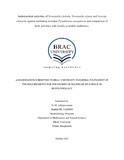| dc.contributor.advisor | Hossain, Dr. Mahboob | |
| dc.contributor.author | Ashiquzzaman, D. M. | |
| dc.date.accessioned | 2018-01-30T05:50:40Z | |
| dc.date.available | 2018-01-30T05:50:40Z | |
| dc.date.copyright | 2017 | |
| dc.date.issued | 2017-10 | |
| dc.identifier.other | ID 11236004 | |
| dc.identifier.uri | http://hdl.handle.net/10361/9287 | |
| dc.description | This thesis is submitted in partial fulfillment of the requirements for the degree of Bachelor of Science in Biotechnology, 2017. | en_US |
| dc.description | Cataloged from PDF version of thesis. | |
| dc.description | Includes bibliographical references (pages 70-83). | |
| dc.description.abstract | The continuous emergence of resistant bacteria is endangering the efficacy of antibiotics across the globe. The antibiotic resistance crisis has been occurring due to the overuse and misuse of these medications. However, the lack of new drug development by the pharmaceuticals making antimicrobial resistance on of the biggest upcoming calamities. Therefore, scientists are selecting plants as a source of medication as plant extracts reportedly have shown potential antimicrobial activities against the microbes and have the potential to serve as the alternative sources to antibiotics. Traditional medicinal plants such as Haritaki (Terminalia chebula), Arjun (Terminalia arjuna) and Chirata (Swertia chirayita) have been used for long to treat various diseases. Thus, the ethanolic, ethyl acetate and chloroformic extracts of these plants were tested against a Pseudomonas aeruginosa strain which showed resistance to thirty antibiotics available in the market and only sensitive to polymyxin B. The extraction method was done via Soxhlet apparatus and Rotary evaporator. The potential antimicrobial activities of crude extract against resistant Psedomonas aeruginosa was obtained via agar well diffusion method. Only ethyl acetate extract of Haritaki (Terminalia chebula), ethyl acetate extract of Arjun (Terminalia arjuna), ethanolic extract of Chirata (Swertia chirayita) showed significant activity against resistant Psedomonas aeruginosa. The highest Zone of was found in ethyl acetate extract of Haritaki (Terminalia chebula) on resistant Psedomonas aeruginosa found (16 millimeter in diameter). The minimum inhibitory concentration (MIC) and minimum bactericidal concentration (MBC) of ethyl acetate extract of Haritaki (Terminalia chebula) was found 25 milligram per milliliter (MIC) and 30 milligram per milliliter (MBC) respectively. The results thus represents a possibility of developing antimicrobial drugs from these medicinal plants. | en_US |
| dc.description.statementofresponsibility | D. M. Ashiquzzaman | |
| dc.format.extent | 83 pages | |
| dc.language.iso | en | en_US |
| dc.publisher | BRAC University | en_US |
| dc.rights | BRAC University thesis reports are protected by copyright. They may be viewed from this source for any purpose, but reproduction or distribution in any format is prohibited without written permission. | |
| dc.subject | Terminalia chebula | en_US |
| dc.subject | Swertia | en_US |
| dc.title | Antimicrobial activities of Terminalia chebula, Terminalia arjuna and Swertia chirayita against multidrug resistant Pseudmonas aeruginosa and comparison of their activities with locally available antibiotics. | en_US |
| dc.type | Thesis | en_US |
| dc.contributor.department | Department of Mathematics and Natural Sciences, BRAC University | |
| dc.description.degree | B. Biotechnology | |

